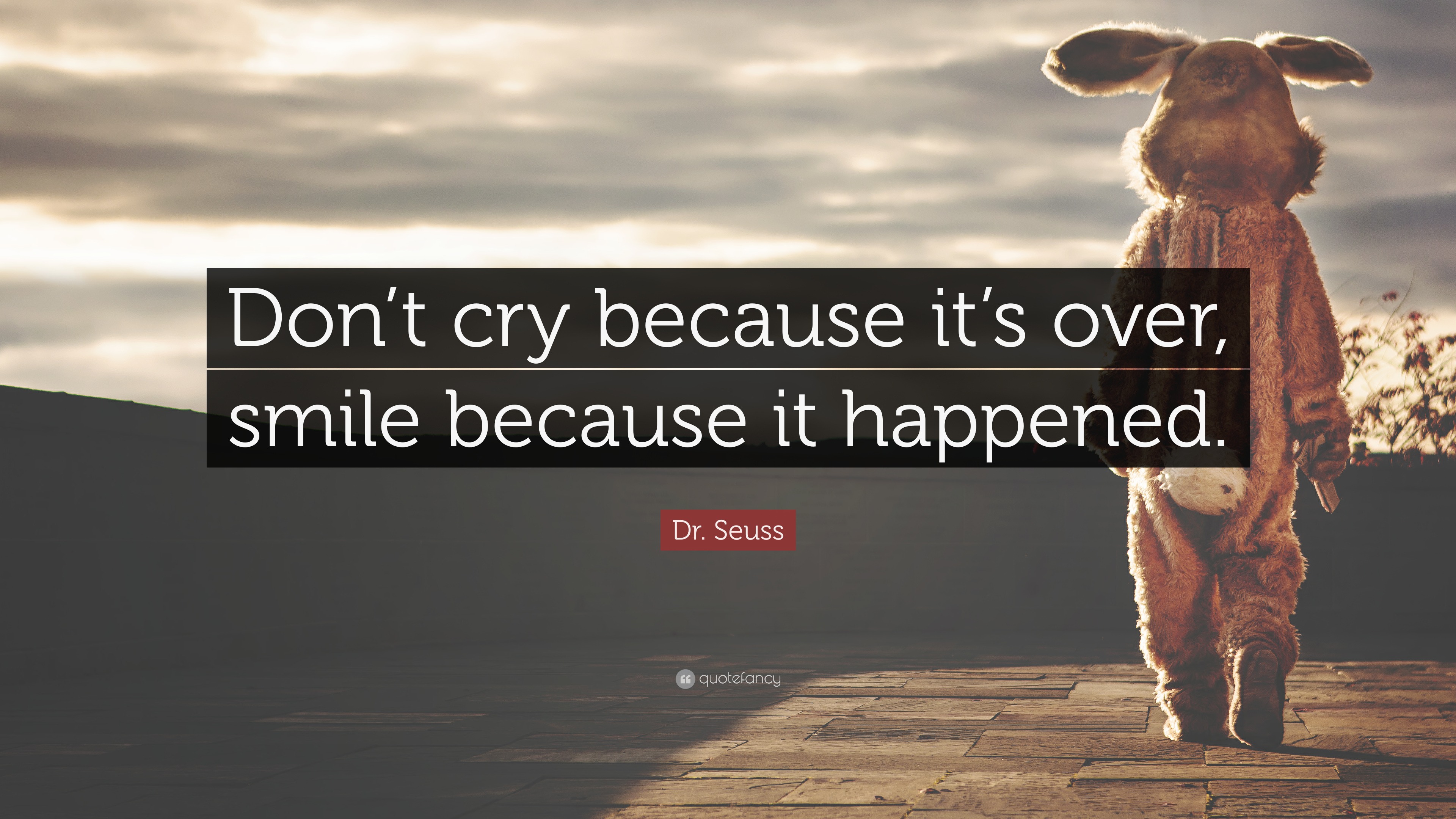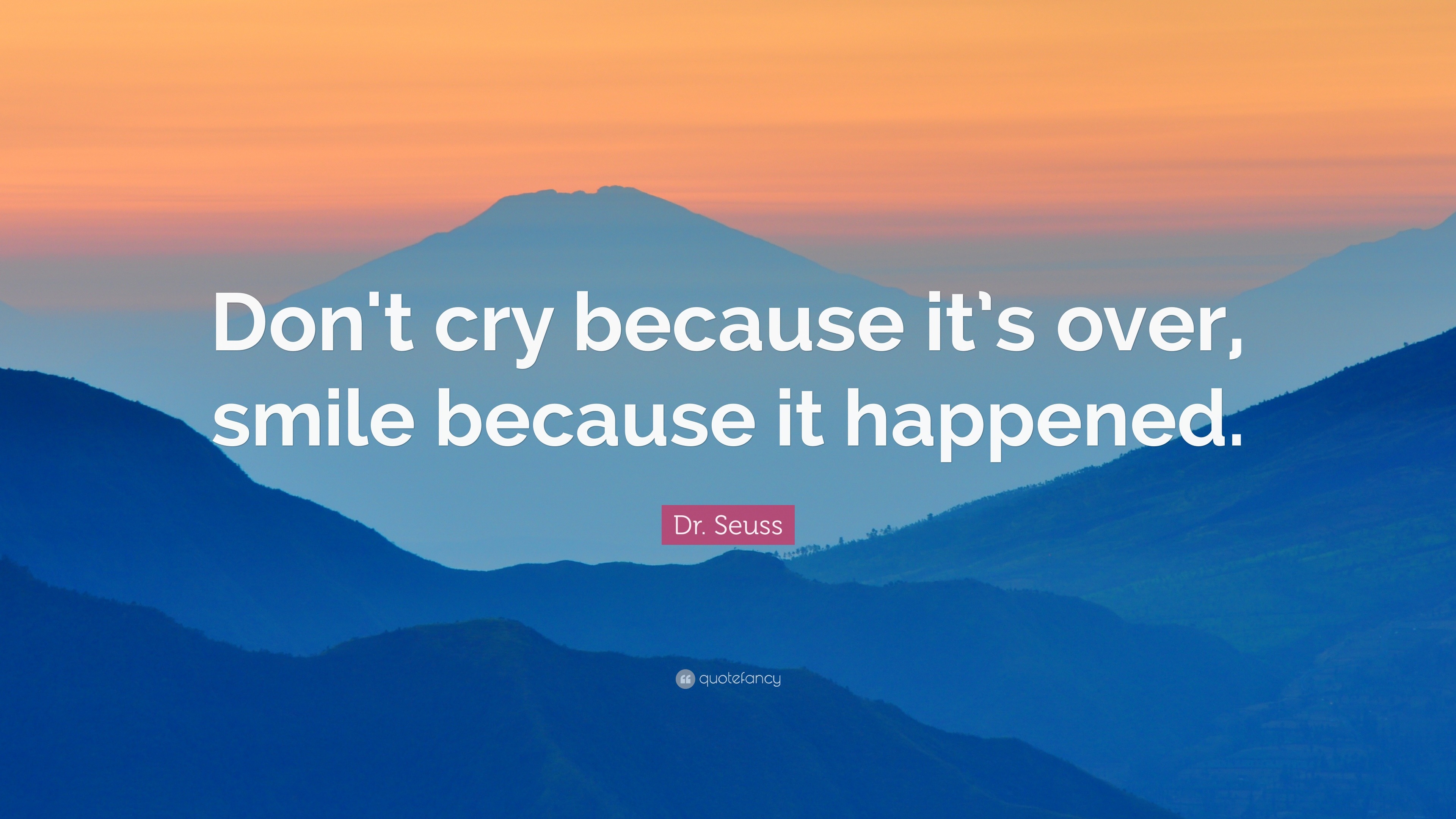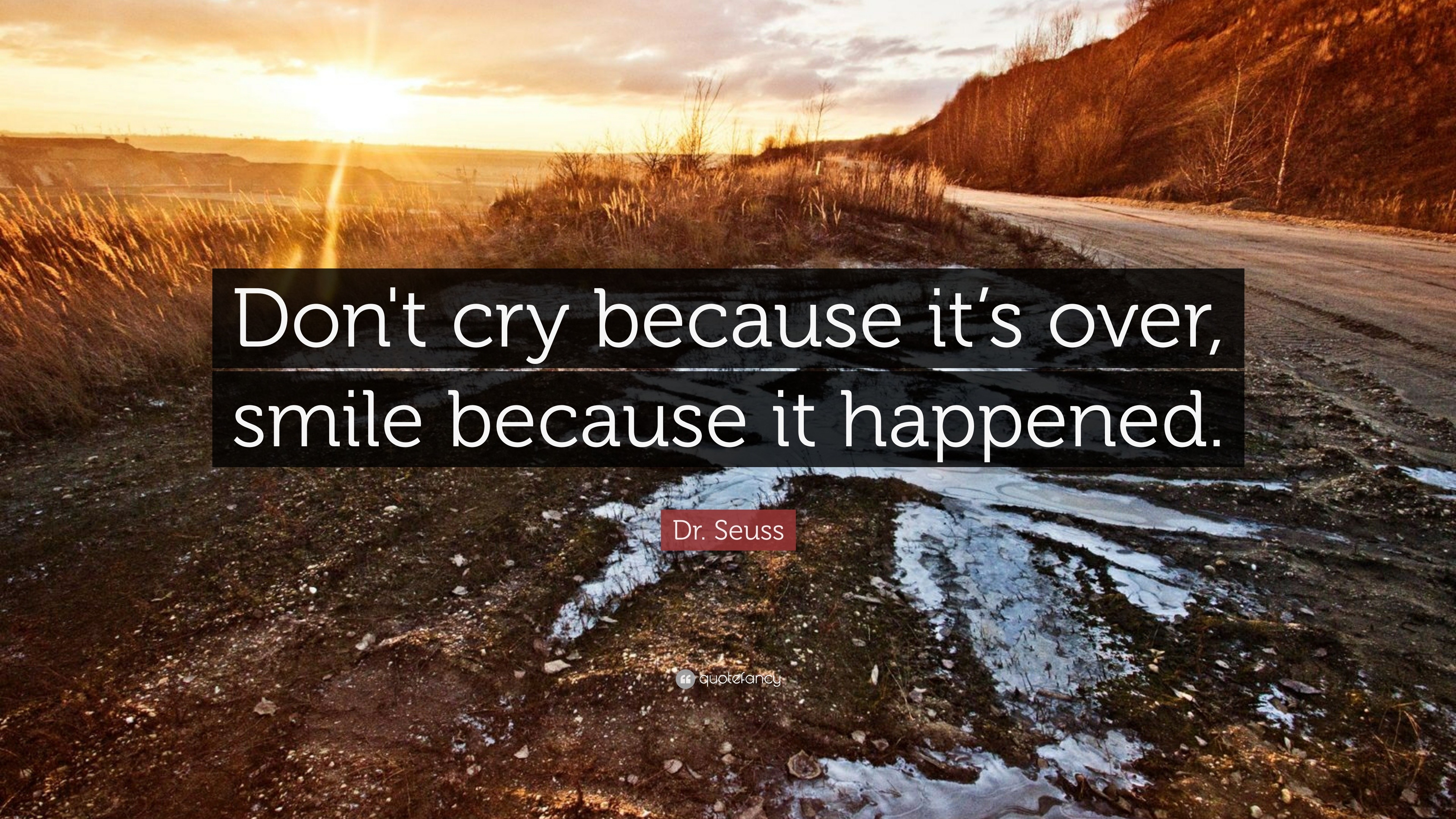Don't Cry Because It's Over-Smile Because It Happened
That well-known saying, "Don't cry because it's over, smile because it happened," often pops up when we think about things coming to an end. It's a phrase that has a way of showing up in many different parts of our lives, offering a gentle thought about how we look back at what has passed. People often hear it, and it seems to stick with them, maybe because it speaks to a very basic human experience of feeling a moment pass away. It’s a bit like a comforting hand on your shoulder, suggesting a way to feel better about good times that are now gone.
You know, this idea gets shared quite a bit when school years finish, or when a relationship reaches its conclusion, or perhaps after a play has its final curtain call, or even following a big sports event. It shows up at all sorts of endings, actually. It’s used when something important in our daily routine stops, or when a period of our lives closes. The phrase is a common way to talk about these moments, giving us a simple way to think about what comes next. It suggests a way to process the feelings that come with goodbyes.
This simple collection of words really encourages us to think about life’s many changes with a hopeful mind, you know? It helps us to see that even though things might feel a little sad when they stop, there is still so much value in the experiences we had. It points to the idea of holding onto the good parts, the lessons learned, and the joy felt, rather than just focusing on the closing chapter. It’s about finding the bright side in memories, even when a situation has run its course.
Table of Contents
- The Heart of a Familiar Saying
- Where Did These Words Come From?
- Is This About Letting Go of Sadness?
- What Does "Don't Cry Because It's Over Smile Because It Happened" Mean for Life's Changes?
- Finding Goodness in What Was
- How Can We Live This Way with "Don't Cry Because It's Over Smile Because It Happened"?
- The Broader Reach of This Idea
- Can We Always Find Joy in What Was?
The Heart of a Familiar Saying
The saying, "Don't cry because it's over, smile because it happened," holds a deep idea about how we deal with the passage of time. It asks us to shift our thoughts from feeling bad about an end to feeling happy about what took place. This is a big change in how we might typically react, you know? It’s about choosing to look at the bright side of things, even when a situation has finished. The words themselves are simple, but their message carries a lot of weight for many people.
It’s often heard when people are talking about things like finishing school, or when a romantic bond ends. It also shows up when a favorite show or a big event has its last moment. The core thought is about appreciating the past, rather than just feeling upset that it is no longer present. It suggests that the value of an experience is not lost just because it has come to a stop. This way of thinking, too, can help us feel a lot better about things that are now behind us.
This phrase, in a way, is a gentle push towards being thankful. It reminds us that every event, every connection, every period of our lives, leaves something good behind. It asks us to think about the lessons we picked up, the fun we had, and the people we shared moments with. It’s about holding onto those good feelings, you know, instead of just seeing the emptiness that comes with an ending. It helps us to see the lasting good in things that are no longer happening.
Where Did These Words Come From?
The exact beginnings of "Don't cry because it's over, smile because it happened" are a little bit fuzzy, actually. Many people connect it with Dr. Seuss, the writer known for his fun books. They often think it came from one of his stories, maybe "Oh, the Places You'll Go!" But, if you look closely at that book, which is, you know, not a very long story at all, with just a few lines on each page, you won't find those exact words there. It’s a common mix-up, apparently.
Some folks have also said that a German poet named Ludwig Jacobowski wrote something very similar a long time ago. His words, from a poem, were more like, "Do not cry because they are past, smile, because they once were!" This was back in 1899, so it shows that the idea has been around for a while, in some form or another. It’s interesting how ideas can move through time and change a little bit as they do, you know?
Then, there are others who link the saying to Gabriel García Márquez, a famous writer from South America. In Spanish, his words are said to be, "No llores porque ya se terminó, sonríe porque sucedió." This also means, "Don't cry because it's over, smile because it happened." So, it seems like this very thought has been put into words by different people, in different places, across many years. It’s almost like a universal feeling, really, that many have tried to put into simple phrases.
It's also been called an anonymous saying, something that just came to be shared by many people without a single known author. A journalist, Christopher Roche, was also mentioned in connection with it. This shows how easily a saying can get passed around and linked to different famous people over time. The true start of it is, in some respects, less important than the feeling it gives to people. It’s a thought that has a way of comforting, no matter who first put it into words.
Is This About Letting Go of Sadness?
This saying, "Don't cry because it's over, smile because it happened," asks us to consider how we handle feelings of sadness when something ends. It doesn't mean that we should never feel upset or that tears are not allowed, you know? It's more about how we choose to view the whole situation. It suggests a way to move past the immediate feeling of loss. The words are about finding a different path for our thoughts, one that leads to appreciation.
Think about it: when a good time finishes, it's natural to feel a bit down. That feeling of something ending can be heavy, like a hundred pounds, as some might say. But the quote encourages us to not let that sadness be the only thing we feel. It’s about balancing the sorrow with the good memories. It’s about saying, "Yes, this is sad, but look at all the good that came from it." This perspective, you know, can really change how we feel inside.
It helps us to see that the value of an experience is not just in its present moment, but in the lasting impact it has on us. So, it's not about stopping tears when someone or something important leaves our lives. It's about keeping our spirits up, even in tough times. It means remembering the good parts and being thankful for the time we had. It's a way of looking at life with a more hopeful view, even when things are difficult. It helps us to move forward with a bit more grace, perhaps.
What Does "Don't Cry Because It's Over Smile Because It Happened" Mean for Life's Changes?
Life is full of changes, isn't it? Things begin, they go on for a while, and then they come to a stop. This phrase, "Don't cry because it's over, smile because it happened," offers a way to deal with all those shifts. It helps us to accept that things do not last forever. It’s about seeing that endings are just a part of the whole story. This idea, you know, can make big life changes feel a little less scary.
When a job finishes, or you move to a new town, or a long-term friendship changes, there can be a sense of loss. The saying encourages us to look beyond that immediate feeling. It asks us to find the good parts of what was, and to carry those good memories with us. It suggests that even though one chapter closes, the experiences from it help shape who we are becoming. It’s about seeing the value in every part of our personal story.
This idea also touches on the concept of ‘nostalgia,’ which is a warm feeling for the past. It’s not just about looking back with longing, but about appreciating the richness of what has been. It’s about recognizing that every ending also opens a door to something new. It helps us to think about the lessons we picked up and the chances we had. This way of thinking, you know, can make us feel more ready for what comes next, even if we are a bit sad about what is no longer.
Finding Goodness in What Was
The core of "Don't cry because it's over, smile because it happened" is about finding goodness in what has passed. It's about choosing to focus on the positive parts of our memories, rather than just the fact that something has ended. This idea serves as a gentle reminder to look for the good in every experience, no matter how it finished. It’s about taking the time to truly appreciate what we had, you know?
Think about a happy event, like a wonderful trip or a special gathering. When it's over, there might be a small feeling of sadness. But this saying tells us to hold onto the joy, the laughter, and the fun we had. It encourages us to let those good feelings fill our minds, rather than dwelling on the fact that the event is now a memory. It helps us to keep those moments alive in our hearts, in a way.
It’s also about being thankful for the chances we were given. Every experience, good or bad, gives us something. It might be a new skill, a deeper understanding of ourselves, or just a moment of pure happiness. The phrase suggests that we should hold onto those gifts. It helps us to see that even bittersweet farewells can bring new adventures and chances to grow. It’s about seeing the full picture, with all its shades, and choosing to focus on the bright ones.
How Can We Live This Way with "Don't Cry Because It's Over Smile Because It Happened"?
Living by the idea of "Don't cry because it's over, smile because it happened" means making a choice about how we face life. It means actively working to see the good in past events, even when they have concluded. It’s not always easy, of course, to change our way of thinking, but it is something we can practice. It’s about building a habit of looking for the bright side, you know?
One way to do this is to take time to think back on good memories. When something ends, instead of just feeling the loss, try to recall the best moments. What made that time special? What did you learn? Who did you share it with? By focusing on these positive aspects, you can shift your feelings. It’s a bit like choosing which picture to hang on your mental wall, really.
Another way is to practice being thankful. Even for small things, being thankful can change your outlook. When you think about something that has finished, try to list all the things you are thankful for about that experience. This can help to soften the sadness and bring in feelings of warmth and joy. It helps us to see the full value of what we had. This simple action, you know, can make a big difference in how we feel about endings.
The Broader Reach of This Idea
The thought behind "Don't cry because it's over, smile because it happened" stretches far beyond just personal feelings. It touches on bigger ideas about how we deal with fate and change. It suggests a way of accepting what comes our way, both good and bad, and finding peace with it. This kind of thinking can be found in many different areas of life, you know, not just in our own personal moments.
It encourages us to accept that things will always change. Nothing stays the same forever. This idea helps us to welcome those changes, rather than fighting against them. It’s about living fully in the present moment, appreciating what is here now, because we know it will eventually become a memory. This perspective can help us feel more calm about the future, too.
This phrase is also seen as a way to have a more hopeful view on life's many shifts. It means that even when things are bittersweet, they can also mark the start of new chances. It’s about seeing endings not as empty spaces, but as openings for new things to come into our lives. This outlook helps us to keep our spirits up, even when things feel a bit uncertain. It’s about finding the good in every turn, really.
Can We Always Find Joy in What Was?
The idea of "Don't cry because it's over, smile because it happened" is a powerful one, but it also makes us think: can we always find joy in what was? It's true that some endings are very difficult, and feeling sad is a very natural and needed part of healing. The phrase does not mean to ignore those feelings or pretend they are not there, you know? It’s about finding a balance.
It’s about making a choice to focus on the good, even when the bad is present. It’s about allowing ourselves to feel the sadness, but then also making an effort to remember the positive aspects. It's about not letting the end overshadow all the good that came before it. This can be a hard thing to do, especially when something truly painful has happened. It’s a process, actually, not just a switch we can flip.
So, while it might not always be easy to smile right away, the saying gives us a goal to work towards. It encourages us to eventually move towards a place of appreciation and thankfulness for what has been. It’s about remembering that even in sorrow, there can be a space for gratitude for the experiences we had. It's about holding onto hope, even when the world seems to say, "Give up." It’s about trying one more time to see the good, you know, even when it feels hard.
- Dutch Broa
- Freebirds World Burrito
- Rodeo Lineup 2025
- Where To Watch Austin Powers
- Monterrey Mexican Restaurant

Dr. Seuss Quote: “Don’t cry because it’s over, smile because it happened.”

Dr. Seuss Quote: “Don’t cry because it’s over, smile because it happened.”

Dr. Seuss Quote: “Don’t cry because it’s over, smile because it happened.”